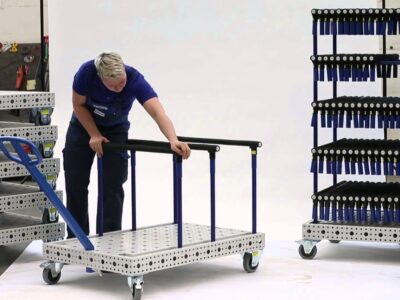4D lean work stations
The mobile 4D lean work station is an intralogistics trolley which offers a high level of flexibility and which can be used both as work station transport trolley. It can be moved from the warehouse, set as work station and equipped with all the necessary material for a specific day of project.
The mobile 4D lean work stations are based on the “Lean manufacturing” philosophy which brings the decision and responsibility closer to the ones which are effectively working. This approach allows them to concentrate on the productive activities and eliminates the unnecessary ones: identification of the transported pieces, of the assembly order, recovery of misplaced pieces and increasing the ergonomics by positioning the pieces at the optimum height and by eliminating the extra maneuvers. There are also eliminated the stops, the hesitations and questions before starting the work.
The studies show a productivity increase with an average of 20%, but also a quality increase due to the fact that operators become more familiar with how they organize and they have all the information at hand.
Most of the times, the materials are not sequentially supplied, so this platform allows a full mobility and eliminates the sophisticated planning.
The platform has predefined holes on which there can be mounted shelves, boxes, racking for special shapes, transportation walls, vertical sheets, hanging systems and panels with information and work documents. After finishing the activity, the work station can be easily dismembered and/ or reassembled. The standardized containers, structural modules and platforms allow the modification of any part, any time, no matter the process’s stage. This has as result the productivity increase.
The trolley represents the base. It has a stable format which can be adapted also to the internal logistic transportation system: handles for pushing, tow bars or protection sheaths for the forklift. This modular system is extremely flexible, can be built effortlessly and in a short time on various heights and shapes, exactly on the specific needs of the operators and their activity. They are focused on optimizing the processes and making them efficient, on creating direct working value.
A possible application of the lean workstations is using them as Kanban support. In this case, the trolley becomes the stand. The restocking time and the material consume set the number of necessary Kanban containers.
In the process of increasing the added value level, the mobile 4D lean work stations eliminate the useless distances within daily activity, sorting the materials, the unpacking, creating an ergonomic work environment. The materials are already individually organized on the trolley at the optimum level height. The order is always the same, this type of recurrence leading to visual automatism and work habits. This type of routine has as result the quick learning, conscious or not, and generates speed and confidence in activity. The organizing varies depending on the materials. The repetition is beneficial both for the logistic part and for the assembly one.
The Lean principles consider that the activities involved in the processes of a business are divided into three:
- those processes which add value to the final product, and for which the client understands and is willing to pay for (for example the customizations applied to a standard product, the request for assembly or mount some equipment, etc.)
- those processes which are required for the products, but which do not add value to the product in that particular moment, and for which the client is not willing to pay for. Here we can consider the audits, internal controls and verifications, managerial approvals, technical support, quality insurance, methods to reduce the risk of any kind, etc.
- those processes which are not necessary for the product, they do not add value, the client is not willing to pay for them, but still, they are absolutely necessary for the day-to-day running and good functioning of the business. Here we have the inventory/ material check ups, defects, reprocessing, etc.
This way, the actions which do not add value are identified and minimized or eliminated, but without affecting the value of the final product.
Lean management uses several important tools:
- automatization
- constant improvement and development of the activities of any kind, like it is the continuous supply with materials according to the confirmed orders (this also means to maintain a good relationship with suppliers), but also quick deliveries to the clients for their orders, so there will not be large stocks of materials, or orders stored for extended periods of time
- accurate planning, coherence, routine for the activities which allow it, very well set rules
- flexibility
- work space organization methodologies, among which is the implementation of products leveling, visual control and production flow control
- elimination of losses caused by: frequent inventories, useless/unnecessary transports, actions/movements/gestures of the operators, machines and equipment involved, ‘dead’ waiting time, excess production, defects requesting corrections, extra processing or adding details/options which are either useless or were not requested
- use to the maximum the human ingenuity, cleverness, talent, abilities, and the machine and equipment technical performances

























